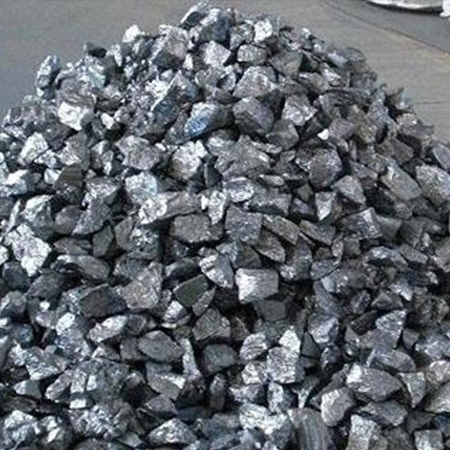Detailed Introduction
1. Definition of Metallic Silicon: Definition of Metallic Silicon
Industrial silicon, also known as metallic silicon or crystalline silicon, is generally referred to as industrial silicon in China, metallic silicon in English abroad, and crystalline silicon in Russian. Industrial silicon is a solid product with silicon content of over 97% generated by reacting silicon rich silica (i.e. silicon dioxide) with carbonaceous reducing agents in a mineral thermal electric furnace. Silicon (Si) is a semi metallic material between metal and non-metal, and China has placed industrial silicon production under the management of non-ferrous metals. Due to the similarity in production equipment and processes between industrial silicon and ferroalloys in the steel industry, industrial silicon is sometimes placed under ferroalloys as a variety of ferroalloys. The main use of metallic silicon is as an additive in non-ferrous alloys. The abundance of silicon in the Earth's crust is 27.7%, ranking second among all elements. The most abundant element in the Earth's crust, silicon dioxide (SiO2), is formed by the combination of oxygen and silicon, accounting for 87% of the total mass of the Earth's crust. Silicon is a non-metallic element, gray in color, metallic in color, hard and brittle in nature. The content of silicon accounts for about 26% of the crustal mass; Atomic weight is 28.80; The density is 2.33g/m3; Melting point 1410C; Boiling point is 2355C; The resistivity is 2140 Ω· m. Metallic silicon is a product produced by smelting quartz and coke in an electric furnace. The main component of silicon is about 98% (in recent years, silicon with a Si content of 99.99% is also included in the category of metallic silicon), and the remaining impurities are iron, aluminum, calcium, etc. Semiconductor silicon is a high-purity metal silicon used to make semiconductor devices. It is sold in polycrystalline and single crystal form
2. Grades and Additional Products of Silicon Metal
The grades of metallic silicon: According to the content of iron, aluminum, and calcium in metallic silicon, it can be divided into 553, 441
Different grades such as 411, 421, 3303, 3305, 2202, 2502, 1501, 1101, etc.
Additional products of metallic silicon include silicon micro powder, silica fume, metallic silicon slag, etc. Among them, silicon micro powder
Also known as silica powder, microsilica powder or silica fume, it is widely used in the refractory materials and concrete industries.
3. The use of metallic silicon grade:
1. Preparation of silicon aluminum alloy: After adding silicon to aluminum alloy, the strength of the alloy can be improved, the oxidation and corrosion resistance can be increased, the density can be reduced, the thermal expansion coefficient is small, the casting performance is good, and the alloy castings have high impact resistance and high density under high pressure.
2. Making cold-rolled silicon steel sheets: Adding silicon to steel can greatly improve its magnetic properties, increase permeability, and reduce hysteresis and eddy current losses.
3. Manufacturing high-purity semiconductors: Due to the high melting point, good thermal stability, wide bandgap, and abundant resources of silicon, the technology for producing high-purity silicon continues to improve. Integrated circuits and large-scale integrated circuits made from silicon semiconductors have been applied in various fields, and their usage is increasing.
4. Making silicone: making silicone rubber, silicone resin, and silicone oil.
Using industrial silicon to make silicone rubber: maintaining elasticity within the range of -700C to 2000C, it can be used as a high-temperature gasket and a material for cold and heat insulation.
Making silicone resin: used for producing insulation paint, with a heat resistance temperature of 180-2000C, and can also be used for producing high-temperature coatings.
Making silicone oil: used for advanced lubricants, polishes, fluid springs, dielectric liquids, etc. It can also be processed into a colorless and transparent liquid and sprayed on buildings for waterproofing.
At present, the application of industrial silicon in the organic silicon industry is becoming increasingly widespread, and its usage is trending to exceed that of silicon aluminum alloys.
5. Make high-temperature resistant materials and other materials:
Produce silicon nitride (Si3N4), which is heat-resistant, wear-resistant, and corrosion-resistant.
Making coating materials can prevent oxidation.
Silicon infiltration on the surface of steel parts can improve their corrosion resistance.





.png)